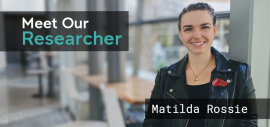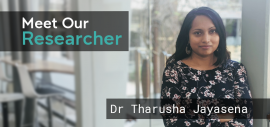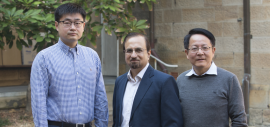Blog: The Brain Dialogues
Ashley Stevens | Meet Our Researcher Series
CHeBA’s Social Health And Reserve in the Dementia Patient Journey project (SHARED) is an international collaborative effort to identify the impact of social wellbeing on cognitive health. There is evidence to support that our social lives have a great impact on our capabilities across the lifespan. Research Assistant with SHARED, Ashley Stevens, hopes that through the study’s outcomes this notion receives the recognition it deserves.
How did you get into researching the ageing brain?
I found my way into research following the completion of my Honours degree in Psychology at Charles Sturt… Read More
Maria Villalva | Meet Our Researcher Series
Maria Villalva, Research Assistant with CHeBA’s Brain Ageing Research Laboratory, is currently involved in developing novel theranostics for Alzheimer’s disease to facilitate earlier disease diagnosis and treatment. Through analysing nanomaterial - particularly quantum dots - the research has opened a new area in nanoneuro research and understanding brain ageing.
How did you get into researching the ageing brain?
When I began my bachelors in Science at Macquarie University, I was still unsure how I wanted my career to play out. One of my mentors encouraged me to consider research as a… Read More
Jessica Turner | Meet Our Researcher Series
Jessica Turner’s grandmother inspired her pursuit of research which initially explored fall prevention for older adults. She is now working with CHeBA’s CogSCAN project which aims to determine the efficacy of using computerised testing to assess cognitive health.
How did you get into researching the ageing brain?
I studied Exercise Physiology at the University of New South Wales and first worked as an Exercise Physiologist in a retirement village and aged care facility, helping older adults who had a variety of health issues - including cognitive impairment. Following this chapter, I… Read More
Abdullah Alqarni | Meet Our Researcher Series
Normal ageing process can be defined as a subtle decline of mental and physical abilities. A decline in our thinking abilities, memorising and recalling memories or thoughts, as well as decline in maintaining attention are examples of the normal ageing process. Normal ageing might differ between men and women due to intrinsic gender differences such as hormonal and genetic traits. Abdullah Alqarni, a PhD Candidate at CHeBA studies the sex differences in white matter hyperintensities and how they affect normal ageing for both sexes.
How did you get into researching the ageing brain?
I… Read More
Matilda Rossie | Meet Our Researcher Series
CHeBA’s CogSCAN study aims to evaluate the efficacy of using computerised testing to determine cognitive health. Research Assistant at CHeBA, Matilda Rossie, hopes that through the study we can develop more easily and accessible cognitive testing to improve the diagnostic experience of dementia patients.
How did you get into researching the ageing brain?
Doing a double degree for my undergraduate allowed me to study a range of fields like psychology, anatomy, sociology, and neuroscience. It was great experience but left me unsure about what I wanted to do or which field I wanted to go… Read More
Nicholas Hoy | Meet Our Researcher Series
Recent research indicates that alcohol use and alcohol-related harms are increasing among older adults. However, few studies have investigated the relationship between alcohol use and cognition in ageing populations. It is essential that research is conducted to examine the role of alcohol use in cognitive decline and dementia, as these issues represent some of the most significant challenges faced by older Australians. Nicholas Hoy, a Research Assistant at CHeBA, is contributing to a large-scale data harmonisation project led by Dr Louise Mewton, which will provide a clearer picture of the… Read More
Dr Tharusha Jayasena | Meet Our Researcher Series
Diet is a key modifiable lifestyle factor to achieve healthier cognitive ageing. There is a wealth of evidence indicating the benefits of adopting a Mediterranean diet for improved brain health. Traditional Mediterranean diets have historically contained moderate amounts of fat, much of it from healthful monounsaturated fats (such as extra virgin olive oil and almonds), omega-3 fats (in foods like oily fish/seafood and walnuts), and polyunsaturated fats in other nuts and seeds. Levels of fatty acids found in blood have been reported to be altered in patients with mild cognitive impairment and… Read More
Virginia Winter | Meet Our Researcher Series
With the world’s ageing population increasingly affected by dementia, CHeBA’s Sydney Memory and Ageing Study offers a rich dataset to explore the nature of dementia and predictors of cognitive decline to mediate the impact of the disease. With over 1,000 participants involved in the study, Research Assistant Virginia Winter can attest to how fascinating and valuable CHeBA’s study participants are. She notes that the generous ongoing donation of their time to research, to support future generations, is inspiring.
How did you get into researching the ageing brain?
While completing my… Read More
J Holden Family Foundation Advances Neuroimaging Research
HEIDI DOUGLASS | h.douglass@unsw.edu.au
“Brain age” is an emerging hot research topic in brain ageing research. Brain age refers to an estimate of “how old a person’s brain is biologically”, representing actual brain health status. For example, a person aged 80 years old may have a healthier brain and more intact brain structures relative to his/her age. In this case, a younger brain age of, for example, 70 will be assigned. By doing so, one can assess the brain’s health relative to chronological age. Research can also be conducted by examining the protective factors in the individuals with… Read More
Lauren King | Meet Our Researcher Series
Research Assistant Lauren King hopes that through CHeBA’s COGNISANCE Project we will achieve global impact on the quality of dementia care and available support services, particularly in those countries where dementia research and support remain quite limited.
How did you get into researching the ageing brain?
At university, I worked in a number of voluntary and paid research assistant roles on projects running in the experimental psychology department. I really enjoyed the systematic approach of research design and implementation whilst working on these projects.
Did you experience… Read More










